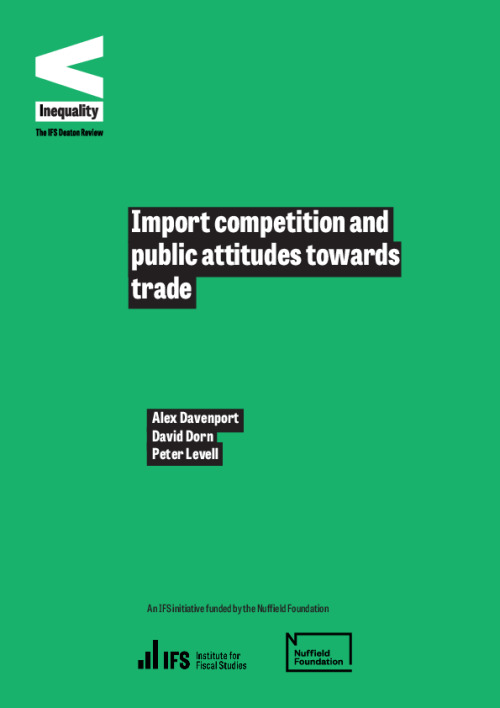The IFS Deaton Review was launched to understand the causes of economic and social inequalities, and their effects on societies and on our political discourse. Such an analysis is particularly important for the economics and politics of trade policy: trade and globalisation can have important economic benefits, but these benefits are often widely, and thinly, spread across many consumers, while the costs of factory closures and changing employment structures can fall disproportionately on specific population groups. Democratic societies have to find a way to manage these unequal impacts if public support for open trade policies is to be maintained and the benefits from free trade are to be realised.
In this report, we use data from the Pew Global Attitudes Survey to analyse how public attitudes towards trade have changed over time in different developed economies, and how these attitudes differ across groups in the population. Attitudes towards trade in developed economies deteriorated in the 2000s even before the onset of the financial crisis, with declines tending to be greater in countries that also saw larger increases in Chinese import competition. Perhaps surprisingly, given that barriers to trade appear to be on the increase again after several decades of steady decline, attitudes towards trade appear broadly positive in many developed economies, and there has been a marked recovery in attitudes over the last decade. The data therefore do not show evidence of increasing scepticism in public attitudes towards free trade in recent years. This may partly reflect the fact that declines in manufacturing employment have slowed in countries such as the US and the UK.
Those with a university education are more likely to have a favourable impression of trade with other countries, and to believe that it has specific benefits in terms of creating jobs, reducing prices and increasing wages. Those without a university education tend to be more sceptical. This is consistent with evidence from studies showing that the effects of increased trade can be unequal, with relatively more adverse impacts for lower-skilled workers. By contrast, those with a university education are much more likely to only experience the upsides of increased trade. While the survey did not ask respondents to assess the impact of trade on jobs for their own education group, it is plausible that people answered these questions through the lens of their own group-specific experiences of trade’s impacts.
Our report also highlights some of the complexities in interpreting public attitudes towards trade. When asked about trade’s specific impacts on jobs, prices and wages, respondents are more likely to believe that trade has benefits through job creation than reduced prices or increased wages. In this respect, the public’s views differ from what we might expect from the various studies on trade’s economic impacts: economists tend to find that increased trade has immediate benefits in the form of lower consumer prices but that it may lead to a deterioration in outcomes for some groups of workers, particularly through reduced employment in some industries.
Public attitudes towards trade may change again in coming years in response to the COVID-19 pandemic, but whether the current crisis will have lasting impacts on public attitudes remains unknown.
Key findings
- Attitudes towards trade deteriorated before the 2008 financial crisis but have rebounded since. Data from the Pew Global Attitudes Survey show that the proportions of people in the US, the UK, France, Germany and Italy holding positive attitudes towards international trade fell between 2002 and 2007. However, by 2018, these declines had largely reversed in all these countries except Italy.
- Declines in positive attitudes towards trade between 2002 and 2007 tended to be greater in countries that saw larger increases in net imports from China relative to the initial size of their own manufacturing workforce. The US stands out as having seen both a particularly large increase in Chinese imports per manufacturing worker over this period and one of the largest deteriorations in positive attitudes towards trade.
- By 2018, a substantial majority of respondents rated growing trade and business ties between their own country and other countries as very good or somewhat good. This was true of around 90% of people in the UK and Germany, and three-quarters of those in the US.
- In most OECD countries covered by the Pew survey, the public is more likely to believe that trade creates jobs than that it reduces prices or increases wages. There is a difference here between the views of the public and of economists, who tend to find that trade has clear and immediate benefits through lower consumer prices but more ambiguous effects on wages and employment, since greater trade may worsen labour market outcomes for some groups of workers.
- Those with a university education are more likely to believe that trade with other countries is somewhat good or very good. They are also more likely to agree that trade creates jobs than those without a degree. This holds true across all OECD countries covered by the Pew survey. For example, in the UK, 57% of those with degrees thought that trade created jobs, compared with 48% of those without a university degree.
- In the US, the UK, Germany and France, declines in positive attitudes towards trade between 2002 and 2007 were greater amongst those without a degree. For example, in the UK, the proportion of those with a degree agreeing that trade with other countries is very good or somewhat good fell by 6 percentage points, while among those without a degree this proportion fell by 15 percentage points. This is consistent with evidence that the impacts of increased Chinese imports during this period were relatively more adverse for workers in less-skilled occupations. Declines in favourable attitudes in Italy were, however, slightly greater among those with a university education.










